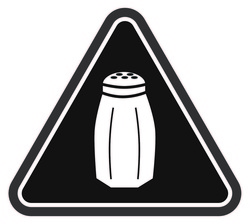 Beginning on December 1 in New York City, food items that are extremely high in sodium acquired a warning label. Specifically, any item that contains more than a full day’s worth of recommended sodium (>2300mg) will now have to be labeled with a somewhat innocuous image of a salt shaker, and the slightly less-subtle warning message: “High sodium intake can increase blood pressure and risk of heart disease and stroke”. The policy will be enforced on menu boards and at the “point of purchase” in most, but not all restaurants - only chains with at least 15 locations are required to comply. So don’t worry - your local mom and pop Italian restaurant is exempt, and you can remain happily unaware of how much sodium you’re consuming as you guzzle Carbonara. Grocery stores appear to be in the clear, too, which may make sense, given that much of American sodium consumption occurs in the setting of “eating out”.
This policy effort is the latest in a long string of changes implemented (or attempted) with a goal of improving public health and nutrition in one of the world’s largest cities. Some of these changes, such as a trans-fat ban and calorie labeling in restaurants, went on to serve as models for the rest of the U.S. Others, like Mayor Bloomberg’s infamous “big gulp ban” on large sodas, did not fare as well. Given the hoopla surrounding prior such changes in NYC (Yes, I’m talking to you, Jon Stewart), undoubtedly there will be vocal opponents to the sodium warning label, too. Claims of “nanny state-ism”, in this particular case, however, seem unjustified. First of all, the health risks of routine, massive over-consumption of sodium, particularly in some population subgroups, have been well-established. Secondly, while some may squabble about whether we risk lowering sodium consumption too much (due to the J-shaped curve linking mortality and urinary sodium excretion), this particular policy, which focuses on food items where a single serving unit literally contains more than a full day’s allowance of sodium, is unlikely to introduce such a risk. Lastly, as the NY Department of Health correctly points out, this type of informational policy does not reduce consumer freedom, but, in fact increases it. Providing New Yorkers with more information about the products they are purchasing may improve their ability to make good choices based on their health needs. How effective this kind of policy will be at actually producing consumer behavior change remains to be seen, and will definitely need to be evaluated. Results from calorie labeling, for example, are mixed, suggesting that the impact of information on behavior varies across subgroups of the population and type of establishment. Regardless of the policy’s direct impact on consumers, it may be the case that posting this kind of information will have the happy side effect of shaming chain restaurants into reducing the amount of salt in their products. So, I say, more power to you, NYC, and may the rest of the country follow suit quickly, with the notable exception of the following BBQ joints……
0 Comments
Your comment will be posted after it is approved.
Leave a Reply. |
©2017 WeighingInBlog. All rights reserved. 401 Park Drive, Boston, MA




 RSS Feed
RSS Feed

